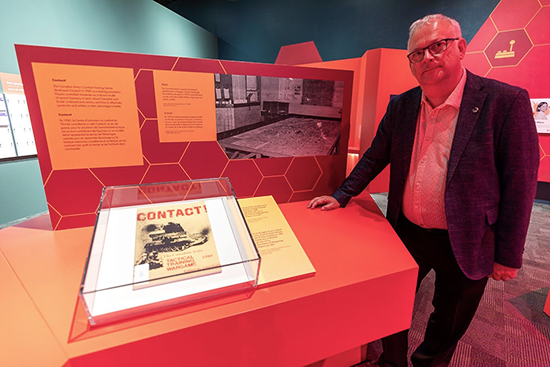Game on! DRDC analysts are serious about war games
June 26, 2023 – Defence Stories

Caption
Past and present: Ben Taylor, a defence scientist with Defence Research and Development Canada’s (DRDC) Centre for Operational Research and Analysis (CORA) checks out the Canadian War Museum’s new exhibit on War Games, which features stories of operational research conducted by defence scientists including this gaming table in Kingston, Ontario during the Cold War.
Serious gaming may seem like an oxymoron, but war gaming continues to be a valuable exercise for modern militaries and governments to work through complex scenarios.
“You can game anything. You just need to know what you want to learn from the game and define the scope,” explains Ben Taylor, a defence scientist with Defence Research and Development Canada’s (DRDC) Centre for Operational Research and Analysis (CORA). He explains that some games are designed to help players practice their skills at risk and options analysis, while others are designed as a teaching tool.
Both in his career and in his personal life, Taylor is an advocate for the benefit of games for improving strategic thinking in many contexts.
“Gaming is a safe and cost-effective way to think through complex problems,” Taylor says. “Games are a ‘safe-to-fail environment’ where nobody gets hurt and no matter the outcome participants will learn something.”
Taylor joined a like-minded group of serious gamers, including federal and provincial government representatives, think tanks and game designers at the Connections North conference at the Canadian War Museum on Friday, June 9 2023.
The games at the conference were all designed by Canadians and featured themes such as a UN disaster relief mission, natural resources management, and a fact-finding mission in a fictional Arctic community. In one game, the players represent government departments with a common goal of helping people during a humanitarian crisis caused by an earthquake. The game is considered semi-cooperative because it requires players to work together, but they also need to protect their limited resources and want to come out of the crisis with an enhanced reputation.
At CORA, analysts use both physical board-based games and digital games that use algorithms and machine learning to provide advice and analysis. Board-based games have the advantage of being inexpensive and quicker to design, whereas digital games offer advantages such as being distributable over networks and requiring less space.
“The challenge for many military organizations is to understand missions that they haven’t seen before,” Taylor explains, adding that gaming is different from rehearsing for various scenarios, because the other players are also actively working to achieve their agenda. War games can help militaries manage limited resources to aid in domestic operations such as fire, flood and pandemic responses, as well as defend Canada in new forms of hybrid warfare that combine physical and cyber attacks.
The conference coincided with the opening of a new exhibition called “War Games” at the Canadian War Museum, which explores the interconnected history of war, play and games. The exhibition includes stories about CORA’s predecessors including the Canadian tactical table that operated out of Halifax, Nova Scotia during the Second World War and the Canadian Army Operational Research Establishment’s war gaming table in Kingston, Ontario during the Cold War. In the modern context, the exhibition also includes the Canadian Joint Warfare Centre, operated by the Canadian Joint Operations Command (CJOC).
Related Links
- Defence Research and Development Canada
- Canadian Joint Warfare Centre (CJWC)
- Canadian War Museum war games exhibit (You are now leaving Canada.ca)
- Audio excerpt of Lt. Carol Hendry describing the naval officers’ training games she conducted as an officer with the Women’s Royal Canadian Naval Service in Halifax in the Second World War (You are now leaving Canada.ca)